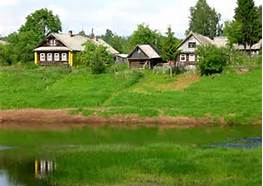
First Aid
On September 18th, the US government announced that the United States Agency for International Development (USAID), after two decades of activity in Russia, will be closing its doors there. In fact, the Russians asked them to go. Actually, I don’t think they really asked.
The Russians, or President Putin’s government anyway, said that USAID had been supporting Russian activists, which was true, of course, but the Russian government, who are not very fond of their activists, who are in fact trying to turn their activists into non-activists, would rather USAID hadn’t. As the Russian government saw it, USAID was meddling in their internal affairs, which I guess they were really: monitoring Russian elections, fighting rampant tuberculosis in Russian society, supporting Russian human rights advocates and trying to improve Russian education.
The Russians can be a bit funny about people coming in to help.
It all happened before to one of the first responders to the chaos of the collapse of the Soviet Union: George Soros and his Open Society. Soros went into Russia in 1987 (five years before USAID appeared on the scene) and in the fifteen years his organization was active there, spent $1 bn on educational, ecological and medical assistance. The stated goal of his organization was to “to promote civil society in post-Communist Russia” and the Open Society, or Soros Foundation as it was called in Russia, did this in a number of ways. Scientists impoverished by the collapse of the Soviet Union were given financial support. Public universities were provided with internet access and textbooks. American teachers were sent to Russian universities where they taught English as well as western teaching methodologies.
I was one of those teachers. I spent ten months at the Togliatti Branch of the Samara State University in Togliatti, Russia teaching English, American Culture and preparing applicants to the Central European University in Budapest to take the TOEFL test. If I was supposed to be a shining light of western culture and democratic values, I’m not sure I was that successful.
And what I mean to say by that is that the Russians both did and did not need my help. They were grateful of course, to get a bona fide English speaker who could clear up some of the oddities of the Soviet-English textbook monopoly. (A typical error would run something like this: “So I went to the party, I communicated with her for about ten minutes and then I went home.”) But despite these occasional linguistic hiccoughs, the overall English of my students (I was teaching students studying to be secondary-school language teachers) was already excellent long before I got there.
As far as western styles of teaching went, I taught them the way I was used to being taught. We read books and articles, we discussed them and then wrote about them. I didn’t notice that any of my students had a problem with this, or a mind-set that prevented them from giving their opinion or listening to someone else’s. What I did notice and admire was my students’ extraordinary ability to memorize things and their willingness to do an awful lot of reading and writing for the next day’s class. They certainly didn’t learn that from me. They got that from the Russian school system we were trying to “improve.”
In the city I was in, there weren’t a lot of Americans. There were a few people from the Peace Corps and a couple who had something to do with the Lada car factory which employed nearly 100,000 of the almost 1 million inhabitants of Togliatti. Other than that, I met no one from the USA, except when I went to Samara, about forty-five minutes away, and bumped into American missionaries out on the streets. I remember being very much annoyed by this at the time. The Russians, after all, had a very ancient faith that they were only just getting the chance to fully embrace again. Why couldn’t we leave them to it?
There was an attitude at that time, prevalent amongst many of the people who had come to Russia to help, that the Russians had messed themselves up so badly that all they could now decently do was lie back quietly and trust us westerners to administer the correct emergency treatment. We were arrogant and the Russians (who can be an arrogant people themselves), didn’t like it very much. But at that time they weren’t in any shape to do anything about it.
George Soros, despite his $1bn, did run afoul of the Russian authorities in the end. In 2003, he publically criticized the jailing of the Yukos CEO Khodorkovsky (who had himself publicly criticized the Russian government) and the Moscow offices of Soros Foundation were raided in November of that year. Already in June, Soros, who had seen the writing on the wall, had gone on record saying that he was going to wind down his activities in Russia. He said that the Russians needed to start funding civil society projects by themselves.
And so Soros Foundation in Russia closed its doors after fifteen years of work just as USAID has done after twenty.
And what will happen as a result? Will it make any difference? Who can say? Did all the work of Soros Foundation transform post-Communist Russian society into a model of democratic values? Hardly. Though hopefully the people it did help remember.
And hopefully the students who studied with me in 1997 and 1998 in Togliatti have some fond memories of that experience as well. Hopefully, they picked up some useful ideas that they then went on to apply in their own teaching careers if that is what they ended up doing. Hopefully, they remember one American who was more interested in them than she was in herself. Certainly, I will never forget being taken by my students to picnic on the autumn cliffs above the Volga, or the girl who recited Svetaeva in class and made us all burst into tears. I will never forget the student who took me to the hospital when I was sick and watched over me throughout my treatment. Or the endless hospitality of every Russian I ever met there. I will never forget all the things I learned from Russia which far outweighed any of the things Russia might have learned from me.





Dear Linda,
I’m sure that lots of people whom you met in Togliatti remember you and are grateful that they had possibility to know you and talk to you and learn from you.
As me and my husband are.
And I am grateful to have met you two and hope that with luck we will all meet again!
Oh, Linda, thank you for this wonderful article, it was really touching…
And I agree with Nadia – all the Russians you met still remember you and think of you with warmth.
As I remember all of them in the same way.
Well, the oddities of the textbooks, yes, it’s an inevitable thing and a great problem for those who learn foreigh languages 🙂
I remember once a Brazilian guy sent me some scans of a Russian textbook because he wanted to know my opinion about that book. He was eager to learn Russian and just could find no other Russian book but that.
I looked through the scans… The words were Russian, of course, but…we never spoke like that using those words in those combination. Well, I advised that poor guy that he should throw the book away.
So, we really cannot underestimate the role of the native speaker while learning a language. And I am happy I was lucky to have you around when I was learning English 🙂
As I said in the piece, your English was very good to start with.